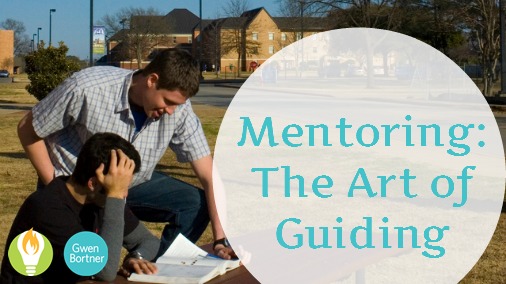I have long been attracted to the mentoring process. I have enjoyed participating in both aspects of this type of relationship – as a mentor and as a protegee. And although I also enjoy the education process, mentoring is different (at least, if it is done well). Education is about giving someone answers or solutions, whereas mentoring is about helping someone discover their own answers.
Sometimes mentoring can be a formal process where individuals are paired up. However, informal pairings can often be just as effective; sometimes even more so. The key is to have (or develop) a good relationship where information, thoughts and concerns can be shared easily – a relationship where trust is developed so one person can successfully guide the other. This is the foundation of all strong mentoring relationships.
Early in my computer science career I was paired up with a mentor through a program of the Small Business Administration (SBA). I had a computer consulting company focusing on software development, and my mentor owned an established business selling computer systems to area businesses. Kate and I were definitely very different people, but I still appreciate the time, advice and mentoring that she provided.
However, as time continued I learned more about successful mentoring relationships. The art of mentoring is in the willingness not only to be a guide, but to also be guided. It really is about a two-way street. Strong mentoring relationships are not all about one person giving so the other person can receive; instead, they are about sharing.
So now, over 20 years since my first formal mentoring experience, I have learned to apply the skills of mentoring (and being mentored) in as many situations as I can (often unbeknownst to the other person). And although in the end, each person and every situation is different, here are are a few of my favorite mentoring skills that I learned from observing some of the best guide dogs:
- Make sure you understand the ultimate destination, but be willing to make detours if necessary. Sometimes there are road blocks that we don’t see or understand at the start of the journey.
- Take clues from the one you are leading; they often have good instincts. And although they may not have the same skills or experience that you have, they usually bring something to the party that you don’t possess. Don’t miss out on the opportunity to learn something.
- Be patient; not everyone works at the same pace and schedule.
- Know when it is time to work and when it is time to relax and play. Part of creating a solid relationship is developing it on multiple levels.
- Don’t try and force it. Either person can do the picking, but the best relationships happen when the pair picks each other.
So what are some of your best experiences either as a mentor or as a protege? Shared experiences are just another way we can all learn to be better! Think about how you can harness the power of mentoring to improve the overall health of your volunteer leadership board.


